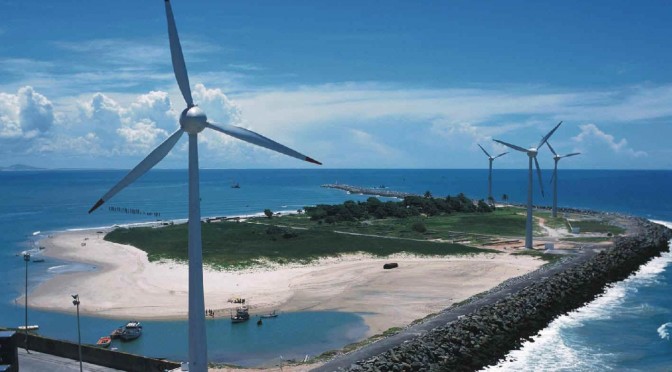Xinjiang Goldwind Science & Technology Co., China’s biggest wind-turbine manufacturer, is in talks to buy all or some of Pescarmona Group’s wind power operations in Brazil, according to Bloomberg.
Goldwind’s board has already authorized a transaction, said one person, who asked not to be identified because the matter isn’t public. The company hasn’t decided whether to pursue a deal for the entire Brazilian unit, Wind Power Energia, which filed for bankruptcy in November, or assets that may include a turbine plant and a port facility.
The deal would be Goldwind’s first move into Brazil’s booming wind market. The country has about 6.8 gigawatts of installed wind capacity, up 50 percent from a year ago, and another 10 gigawatts are under construction, according to the country’s wind power association known as Abeeolica. While that’s attracting suppliers from around the world, local-content rules require developers to use turbines produced or assembled domestically to qualify for state financing.
“Brazil has the potential to generate 300 gigawatts of wind energy and Goldwind has chosen the market for its expansion,” Rafael Guerra, Goldwind’s business development manager in Brazil, said in an interview. “We have been studying the Brazilian market for years.”
Goldwind has hired a law firm and a financial adviser to facilitate its entry into Brazil, he said, without commenting on specific details of an acquisition.
Pescarmona Group is in talks with potential bidders, Ismael Jadur, a spokesman for the Mendoza, Argentina-based company, said by telephone, without identifying any. Its assets in Brazil include a turbine factory and facilities at Suape Port, in the northeastern state of Pernambuco.
It also has wind farms and a factory that produces equipment for hydroelectric dams, which Goldwind isn’t considering, according to one of the people.
Pescarmona Group ran short of cash last year after it failed to win contracts at Argentine hydroelectric projects and payments from some customers in Brazil and Venezuela were delayed. It defaulted on $390 million in bonds after missing an interest payment in September. The bonds are trading at 9.8 cents on the dollar, down from about 53 cents a year ago.
Wind Power Energia’s operations were effectively paralyzed when the unit filed for bankruptcy in November.
The sale of the Brazil wind assets would bring some relief to the local market, which is facing a turbine shortage, according to Helena Chung, a Sao Paulo-based analyst for Bloomberg New Energy Finance.
The turbine factory in Brazil has a production capacity of 1 gigawatt “and taking it off the market was a big thing,” said Chung. “One of the biggest problems for wind projects to get contracts in energy auctions is the turbine shortage. An acquisition would be the best way to guarantee that the market will have machines as soon as possible.”
After the bankruptcy filing, wind-energy developers in Brazil pulled out of turbine deals worth billions of dollars.
Furnas, a unit of the state-run power utility Eletrobras, canceled at least $1.6 billion in contracts and is now seeking an alternate supplier. A press official didn’t immediately respond to an e-mail seeking for comments.
Hidro Eletrica do Sao Francisco, known as Chesf, is also seeking turbines to finish the 180-megawatts Casa Nova I wind project after a contract with Pescarmona Group as canceled in December. Goldwind is about to present a supply proposal, Jose Carlos de Miranda Farias, Chesf’s chief executive officer, said by telephone Tuesday.
Acquiring local operations would give Goldwind a foothold in the Latin American market, said Pan Xifeng, a China-based analyst for Northeast Securities Co. “Acquisitions or joint ventures would help Chinese turbine makers to enter the market with local content requirements and to secure loans in Brazil.”


